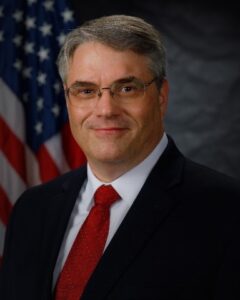Skip to content

Dr. Chris Frey is the Associate Dean for Research and Infrastructure of the College of Engineering, and the Glenn E. and Phyllis J. Futrell Distinguished University Professor of environmental engineering in the Department of Civil, Construction, and Environmental Engineering, at North Carolina State University. His research includes measurement and modeling of human exposure to air pollution, measurement and modeling of vehicle emissions, probabilistic and sensitivity analysis methods, and probabilistic assessment of power generation environmental technologies. He has led over 70 research studies, published over 150 peer reviewed journal papers, and delivered over 200 invited talks nationally and internationally. He has taught courses on air pollution control, air quality, environmental exposure and risk assessment, transportation energy and emissions, civil engineering systems, and sustainable infrastructure. Dr. Frey has been on the faculty at NCSU for over 30 years.
Dr. Frey was on leave from NCSU from February 1, 2021 to September 30, 2024 to serve at the U.S. Environmental Protection Agency. He was appointed by President Biden as Deputy Assistant Administrator for Science Policy on February 1, 2021, providing strategic direction for EPA research and science policy. Dr. Frey was subsequently nominated by President Biden and confirmed by the United States Senate as Assistant Administrator for Research and Development of the U.S. EPA, a role in which he served from May 25, 2022 to September 30, 2024. He led the EPA Office of Research and Development, with an annual budget of over $500M, over 1500 Federal FTE, and 12 locations across the U.S. with a mission to develop and translate science to inform decisions within the Agency and of Agency partners including states, Tribes, local and territorial governments, and communities. He also served as the Agency’s Science Advisor.
Dr. Frey had previously interacted with U.S. EPA in numerous science roles. He was a AAAS/EPA Environmental Science and Engineering Fellow at ORD’s National Center for Environmental Assessment in 1992 and served a one year IPA assignment as exposure modeling advisor in ORD’s National Exposure Research Laboratory from 2006 to 2007. He was a member of the EPA FIFRA Scientific Advisory Panel (2004 to 2006), a member of the EPA Clean Air Scientific Advisory Committee (CASAC) (2008 to 2012), chair of CASAC (2012 to 2015), and a member of the EPA Science Advisory Board (2012 to 2018). He chaired CASAC reviews of lead, nitrogen dioxide, and ozone, and has served on CASAC review panels for all criteria pollutants regulated under the National Ambient Air Quality Standards. He was a member of the CASAC Particulate Matter Review Panel that was dismissed in 2018: under his leadership, the panel reconvened as the Independent Particulate Matter Review Panel.
Dr. Frey has had numerous other science advising and expert roles, including serving on National Research Council (NRC) committees, on the NRC Board of Environmental Studies and Toxicology, on a World Health Organization (WHO) working group on uncertainty in exposure assessment, as a contributor to the U.S. Department of Transportation report to Congress on Transportation’s Role in Reducing U.S. Greenhouse Gas Emissions, as a contributor to NARSTO reports on emission inventories and air quality management, and as an expert and lead author on uncertainty for the Intergovernmental Panel on Climate Change (IPCC) Guidelines on National Greenhouse Gas Emissions. He was a member of the Transportation and Air Quality Committee (ADC20) of the Transportation Research Board and the Publications and Critical Review committees of the Air & Waste Management Association. In 2018, he wrote and delivered the 48th Annual A&WMA Critical Review on “Trends in Onroad Transportation Energy and Emissions.”
Dr. Frey is a Fellow of the Air & Waste Management Association (A&WMA) and of the Society for Risk Analysis (SRA), served on the A&WMA Board of Directors (2015-2018), and was President of SRA in 2006. He received the Chauncey Starr Award from SRA in 1999, the Lyman A. Ripperton Award from A&WMA in 2012, and the Frank A. Chambers Award from A&WMA in 2019. He has a B.S. in mechanical engineering from the University of Virginia, a master of engineering in mechanical engineering from Carnegie Mellon University, and Ph.D. in engineering and public policy from Carnegie Mellon.

